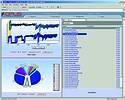
Formerly known as the Atomic Energy Corporation, the South African Nuclear Energy Corporation (NECSA), has installed locally developed business reporting and analysis software, Opus, at the SAFARI-1 Research Reactor at Pelindaba to generate automated reports virtually free of human intervention.
Gordon Procter, head: facility development for SAFARI-1, comments on why the organisation chose Opus: "Opus is locally developed, which means that we have direct access to the developers and were able to establish a good relationship with them. Also, many of the requirements we had in terms of the software's functionality were incorporated by Opus Technologies into the latest version of the product."

SAFARI-1 is rated amongst the top semi-commercial research reactors in the world, particularly regarding medicinal isotope production. The facility has been running for 37 years and has to date contributed close on two million megawatt hours to the national grid. Used as a research reactor for materials testing and training, it produces a range of 50-60 isotopes, many of which can only be produced through the nuclear fission process. A large quantity of Neutron Transmutation Doping (NTD) of silicon for the semiconductor industry is also performed for international clients.
Isotopes produced at the NECSA are largely medical in their application, and are used in the diagnosis and therapy of cancers and other diseases and are targeted to specific organs. Industrial isotopes are also used as tracers, for diagnostic and non-destructive evaluation applications. To date, more than one million patients (local and international) are treated annually with molybdenum-99 and other specialist medicinal isotopes produced at NECSA.
Additionally, the facility is applied for non-destructive testing using the neutron radiography technique - this has been used for testing of aircraft metal sections, and the technique complements X-ray inspections. Fundamental and applied research using neutron diffraction is done on a regular basis. This is the only facility offering these services in southern Africa.
SAFARI-1 use the Opus reporting and business analysis software as an interface for users between the Adroit supervisory control and data acquisition (scada) system, multiple Microsoft databases such as MS Access, as well as to retrieve data from their internal high-speed data acquisition, Visual Automation.
Exporting Ytrium, and several other medical isotope, to 43 countries, SAFARI-1 uses the Opus system to automatically provide the isotope production facility at NECSA with reports during the irradiation phase of isotope production, which are used for scheduling and quality analysis (QA) records. The reports are used at the isotope plant to schedule production of this specific product to avoid wastage and downtime.
The isotope production plant is located remotely from the main SAFARI-1 building where Opus is used for central reporting. The reporting software has been configured in such a way as to automatically generate reports on parameters such as the neutron flux density in the fission process, and to e-mail this report to the isotope production unit daily at 06:30 on the previous 24 hours' activities. One of the major advantages of this system is that reports are completely computer generated and thus virtually free of human interference and also not reliant on human memory to generate and send the report at regular intervals.
The remote location of the isotope building means that it receives a comprehensive 24-hourly activities report via e-mail without compromising the security of the central SAFARI-1 computer network, by not allowing remote access via a direct pathway.
SAFARI-1 was one of the first research reactors to gain its ISO 9001 certification. In this same vain of excellence, they are currently using the Opus reporting and analysis software to achieve ISO 14000 (environmental) certification in the near future. SAFARI-1 is in the process of setting up the Opus system to monitor environmental conditions such as atmospheric releases and effluence discharges. By employing a reporting system such as Opus, SAFARI-1 is assured that these environmental reports are virtually free of human interference and can be supplied to regulators and other authorities. SAFARI-1 management also plan to monitor water consumption and other resources with Opus in the future.
For more information contact Megan Davidson, marketing manager Opus Technologies, 011 781 3665, [email protected]
© Technews Publishing (Pty) Ltd | All Rights Reserved